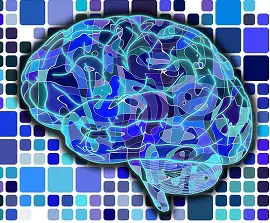- Home
- Better Memory
- Healthy Body Weight
Healthy Body Weight to Avoid Memory Loss
Want your brain to function at its best and avoid memory loss? Achieve and maintain a healthy body weight for the rest of your life.
According to studies, overeating may DOUBLE your risk of memory loss, cause your brain to shrink, and lower your overall cognitive ability!
To get in shape isn't easy, but it could protect your mental health. Being overweight or obese is a risk factor for learning impairment, dementia, and memory decline.
A "healthy body weight" doesn't mean you have to be a body builder or a fitness model. The goal is simpler: Don't be too thin or too fat.
The Body Mass Index (BMI) scale is a useful measure of fatness. Below I explain how to use the BMI to understand how overweight you might be so you can set a weight loss goal.
Stay in the healthy BMI weight range, and your brain may function better. You'll also be at less risk for serious conditions like dementia, heart disease, joint problems, and diabetes.
Some people are underweight, but millions more have the opposite problem. There is an obesity epidemic in the US and worldwide. According to statistics published by the National Institutes of Health (NIH), more than two-thirds (two out of three) adults in the US are considered overweight or obese.9

I was overweight in the past (see photos at right), but I took action and got in shape. I'm 5ft, 10in tall. At age 30, I weighed 190lbs.
For my height, that put me squarely in the "Overweight" range of the BMI scale.
Today at age 48, I weigh 167 lbs, or 23lbs less than my previous weight. Now I'm in the "Normal" BMI range, and I plan on staying there.
I didn't start out in great shape. But I've learned tips and tricks on how to lose weight slowly and steadily to achieve a healthier body weight. I'll share my weight loss advice and tips with you on this website.
Regardless of current weight or fitness level, it's possible for almost anyone to lose fat and get in better shape. Healthy eating, exercise, and consistent goal setting are the foundations for making the transition to a healthier body weight.
Too Much Body Fat Hurts Body & Brain
It's well-known that high body fat is a risk factor for diabetes, high blood pressure, cancer, and other diseases. For example, here's a scary fact: excess body weight contributes to 20% of all cancer-related deaths, according to the American Cancer Society.
But what many people don't realize is excessive body fat also elevates the risk for cognitive problems. According to research, an unhealthy body weight increases the risk of memory loss, learning problems, and even Alzheimer's disease.
In fact, being overweight could double or triple your chance of developing memory problems:
Abnormal fat metabolism has been known to pose a risk for memory and learning. People with high amounts of abdominal fat in middle-age are 3.6 times as likely to develop memory loss and dementia later in their life. 1
Furthermore, once dementia takes root, it tends to get worse much faster if that person is overweight:
Dementia progresses more quickly if someone is physically unwell, so it is important that the person looks after themselves. This includes regular physical exercise, not smoking, drinking alcohol only in moderation, eating a healthy diet, and keeping to a healthy weight.10
To enjoy better brain function and overall health, take steps to get your weight closer to the Normal range on the BMI scale. Reaching a healthy body weight (or moving in that direction) can improve your memory now, and it may decrease your chances of memory loss and dementia later.
The Obesity Epidemic: Causes and Solutions
Don't wait for symptoms of dementia and other health problems to arise before taking action. Cognitive problems can occur even without the presence of chronic disease like hypertension or diabetes. Being overweight, in itself, has the potential to impair brain function and even shrink the size of your brain!
As reported in National Geographic News, in long-term study of people in their early 60s the hippocampus shrank close to 2 percent a year in those who were obese. The hippocampus is an important memory center in the brain, and this rate of shrinkage approaches levels seen in Alzheimer's disease.4
As Judy Cameron, a neuroscientist at the University of Pittsburgh, explains:
By losing weight and exercising more, they [obese, sedentary people] would be much more protected against neurodegenerative diseases. It's a message that needs to get out to the public.
If you are carrying around too much weight and are experiencing memory problems, don't despair. Studies indicate that negative effects may be partially reversed by losing the weight and adopting a healthy lifestyle.
How Being Overweight Hurts the Brain
Next let's look at specific ways a high body fat percentage affects the brain. When you see this list, I think you may be extra-motivated to achieve a healthy body weight.
If you are overweight or obese, you may be at increased risk of:
Brain shrinkage6
Steeper mental decline5
Lower general cognitive ability5
Decreased working memory and long-term memory4,7
Poor organizational skills and planning6,8
Poor attention and focus switching6
Poor time management6
Worse at remembering details6
A much older-looking brain6
Higher risk of ischemic stroke8
Higher risk of Alzheimer's disease6
Higher risk of Mild Cognitive Impairment (MCI)6
(See the "References for Healthy Body Weight" section below to view the sources for this list.)

Unhealthy Body Weight Hurts Memory
Some of these problems are linked to chronic diseases such as hypertension and diabetes that affect the brain. However, even overweight individuals without chronic diseases may be at risk of cognitive problems.
In case you're thinking "not me," consider that even slightly overweight people may be at some risk. Consuming just a few hundred calories above normal each day could put you at risk for Mild Cognitive Impairment (MCI), as found by a Mayo Clinic study.2
During this study of 1,200 seniors between 70 and 89 years old, titled "Overeating May Double Risk of Memory Loss," researchers with the Mayo Clinic uncovered a dose-dependent, positive link between memory loss and total calories consumed daily.
"The higher the amount of calories consumed each day, the higher the risk of MCI," according to Dr. Yonas Geda, an author in the study.
The Mayo Clinic study took into account each person's history of stroke, diabetes, education, and other factors that affect memory loss. Total calorie count was strongly linked to risk of cognitive impairment regardless of other factors in their medical history.
As this study found, the more total calories a person eats, the higher their risk of cognitive decline. This leads to an important observation:
"Cutting calories and eating foods that make up a healthy diet may be a simpler way to prevent memory loss as we age," said Geda.
Whether underweight or overweight, young or old, you may be at risk of poorer memory and cognitive problems compared to people who have a healthy body weight. As concluded by a study published in the American Journal of Clinical Nutrition:
Long-term obesity and long-term underweight in adulthood are associated with lower cognitive scores in late midlife. Public health messages should promote a healthy weight at all ages.3
Study after study confirms these findings. A Swedish research study headed by Anna Dahl, MS, of Sweden's Jonkoping University compiled statistics from Swedish twins over 40 years. The results were the same for both men and women: individuals with higher midlife BMI scores had lower cognitive ability and faster mental decline over time.5
Rather than waiting until you begin to experience cognitive problems or other health issues associated with your weight, why not start a healthy weight-loss program today?
Healthy Body Weight: Measure Your BMI
Now let's turn to the Body Mass Index (BMI), a scale of measuring fatness that I mentioned above. The BMI is a quick and easy way to find your general starting point before you consider a program of weight loss.
You can use any of the BMI calculators on the web to quickly generate your estimated BMI score.
The BMI score does have limitations. It isn't accurate for body builders, certain athletes, fitness models, professional dancers, or others who have a low body fat, high muscle mass ratio. These people may in fact have a healthy body weight not reflected by their calculated BMI score.
But experts do recognize the BMI as a general estimate of body fatness for the average person and a good screening tool. If you've just started thinking about weight loss, it helps to know your BMI.
As the Centers for Disease Control (CDC) says:
BMI provides a fairly reliable indicator of body fatness for most people and is used to screen for weight categories that may lead to health problems.
The two BMI categories associated with higher health risk are "Overweight" and "Obese". If your BMI falls in one of these categories, you may be at increased risk for cognitive problems and other diseases.
Consider whether your calculated BMI seems to accurately reflect your situation. If it does, try to lose enough weight to get your BMI out of the "overweight" or "obese" category and down into the healthy "Normal" range.
Now you've got another motivation to lose weight: the health of your brain. If you are overweight or obese, lower your risk of memory loss or other cognitive problems by getting your weight under control.
There is no single trick or solution to weight loss. But there are plenty of steps you can take to achieve a healthy body weight. The Obesity Epidemic video above, published by the CDC, provides the following general tips for a healthy lifestyle which encourages safe and healthy weight loss:
Eat more fruits and vegetables and fewer foods that are high in fat and sugar.
Drink more water [or tea] instead of sugar drinks.
Everyone, including adults of all ages and ability levels and children, needs to get the recommended amount of physical activity.
Parents can listen to their pediatricians and restrict television viewing for their young children to less than 2 hours a day. Avoid putting televisions in your children's bedrooms.
Beyond these recommendations there are many diet and exercise programs available from different sources. Try to find a weight-loss approach you can stick to and that makes the most sense for your situation.
Note: Always consult an appropriate medical professional before changing your diet or starting an exercise program. Your doctor can point out areas of concern based on your medical history to give you the best chance of success.
Published: 03/16/2016
Last updated: 04/24/2020
[+] References for Healthy Body Weight
Published: 03/11/2016
Last Updated: 06/11/2020

Newest / Popular
Multiplayer
Board Games
Card & Tile
Concentration
Math / Memory
Puzzles A-M
Puzzles N-Z
Time Mgmt
Word Games
- Retro Flash -
Also:
Bubble Pop
• Solitaire
• Tetris
Checkers
• Mahjong Tiles
•Typing
No sign-up or log-in needed. Just go to a game page and start playing! ![]()
Free Printable Puzzles:
Sudoku • Crosswords • Word Search







